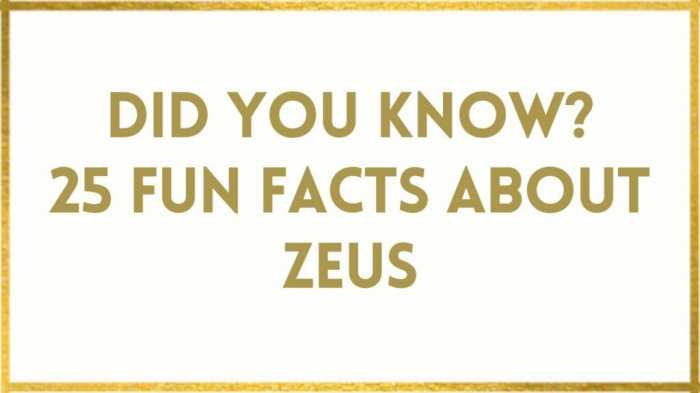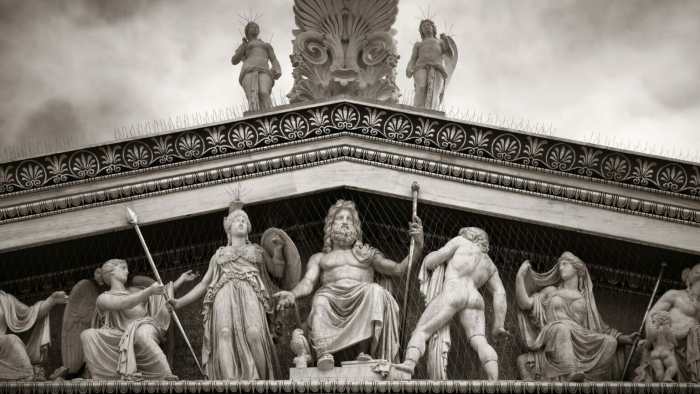What can be concluded about Zeus, the king of the Greek gods, unveils a captivating exploration into the realm of mythology, revealing the attributes, mythology, and enduring influence of this revered deity.
Zeus, with his dominion over the skies and thunder, stands as a figure of immense power and authority in Greek mythology, shaping its narratives and inspiring awe in both mortals and gods alike.
Attributes and Characteristics of Zeus
Zeus, the king of the gods, is characterized by his immense power, authority, and dominion over the heavens and all other gods. His prominent attributes include:
- Thunderbolt:Zeus’s iconic weapon, symbolizing his divine authority and power to punish mortals.
- Aegis:A magical shield made of goatskin, adorned with the head of the Gorgon Medusa, which instills terror in his enemies.
- Eagle:The eagle, known for its sharp eyesight and strength, serves as Zeus’s messenger and symbol of his sovereignty.
- Olympus:Zeus’s celestial abode, located on Mount Olympus, where he presides over the affairs of the gods and mortals.
In addition to these physical attributes, Zeus is also associated with various divine domains:
- King of the Gods:Zeus is the supreme ruler of Mount Olympus and commands the respect and obedience of all other gods.
- God of the Sky:Zeus controls the weather, thunder, and lightning, and his presence is often accompanied by thunderous storms.
- God of Law and Order:Zeus upholds justice and maintains the balance of the cosmos, punishing those who break the divine laws.
- God of Fate:Zeus is said to control the destinies of both gods and mortals, guiding their paths and determining their futures.
Zeus in Greek Mythology

Zeus played a pivotal role in Greek mythology, shaping its narrative and influencing the lives of gods and mortals alike. He was the father of many significant figures, including Athena, Apollo, Artemis, and Hercules.
Zeus’s relationships with other gods were often complex and fraught with tension. He had numerous wives, including Hera, his queen, and fathered children with both goddesses and mortal women. His rivalry with his brothers, Poseidon and Hades, for control of the universe is a prominent theme in Greek mythology.
Zeus’s interactions with mortals were equally significant. He often intervened in human affairs, sometimes to punish hubris and other times to reward piety. His amorous adventures with mortal women resulted in the birth of several legendary heroes, such as Perseus and Heracles.
Zeus in Literature and Art
Zeus has been a subject of fascination and inspiration for writers and artists throughout history. In ancient Greek literature, he is portrayed as a powerful and majestic figure, often appearing in the epic poems of Homer and Hesiod.
In Greek sculpture, Zeus is depicted as a mature, bearded man, exuding authority and strength. His colossal statue at Olympia, created by the renowned sculptor Phidias, was considered one of the Seven Wonders of the Ancient World.
Zeus’s image has also been represented in paintings and pottery, showcasing his various attributes and roles in Greek mythology. These artistic depictions have contributed to the enduring legacy of Zeus in Western culture.
Zeus and Other Cultures

The attributes and mythology of Zeus have parallels in other cultures, particularly in Roman mythology. The Roman god Jupiter is largely based on Zeus, sharing similar characteristics and divine domains.
Cultural exchange and influence surrounding the worship of Zeus can be seen in the adoption of his name and attributes by other civilizations, such as the Etruscans and Celts. This cross-cultural exchange contributed to the widespread recognition and significance of Zeus in the ancient world.
Zeus in Modern Interpretations: What Can Be Concluded About Zeus

The enduring legacy of Zeus continues in contemporary popular culture and media. His image and mythology have been adapted and reinterpreted in various forms, including:
- Literature:Zeus appears as a character in modern novels, plays, and poems, often exploring his complexities and relevance to contemporary themes.
- Film and Television:Zeus has been portrayed in numerous films and television shows, ranging from mythological adaptations to modern reimaginings.
- Art:Contemporary artists continue to draw inspiration from Zeus, creating works that reflect his enduring cultural significance.
These modern interpretations of Zeus demonstrate his enduring power as a symbol of authority, justice, and the complexities of human nature.
Common Queries
What are Zeus’s most prominent attributes?
Zeus is known for his power over the skies, thunder, and lightning, as well as his role as the king of the gods.
How is Zeus portrayed in Greek literature and art?
Zeus is often depicted as a majestic figure with a long beard and a thunderbolt in his hand. He is also frequently portrayed as an eagle or a bull.
What is Zeus’s significance in Greek mythology?
Zeus is the central figure in Greek mythology, and his actions and decisions shape the course of events.